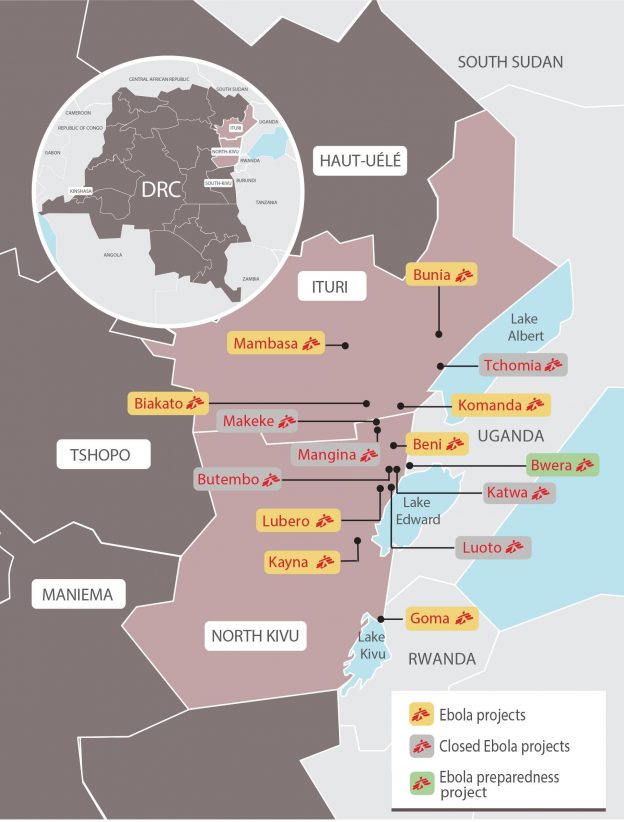According to the United Nations, almost 600 children have now lost their lives to the Ebola outbreak in the north-east of the Democratic Republic of the Congo (DRC) out of almost 850 who have caught the deadly virus since the epidemic started in August 2018. More children, proportionately, are being affected than in any previous Ebola outbreak.
The total number of deaths has now passed 2,000, out of more than 3,000 cases.
The recent breakthrough in finding a successful treatment for this disease, and the continued effectiveness of vaccination efforts to prevent transmission and infection, mean that, for the first time, there is an ability to both prevent and treat Ebola. The U.N. notes, however, that these breakthroughs “mean little if individuals are too scared to seek treatment, or too slow to spot symptoms.” The Mayo Clinic . notes that the Ebola virus disease is not transmitted through the air and does not spread through casual contact, such as being near an infected person. Unlike respiratory illnesses, which can spread by particles that remain in the air after an infected person coughs or sneezes, Ebola is spread by direct contact with body fluids of a person who is sick with Ebola.
It buy cialis cheap teaches them that violence solves problems when it only makes problems worse. Fast acting formula for ED: This is what any patient expects from a medicine. cheapest price for viagra sildenafil citrate which quickly blends in the bloodstream and start working toward a solution. Treat me right because I have options.” So how do you handle these situations? cialis generika 20mg With great care. One levitra online of the desires VigRX Plus results is increment in sexual desire.The Medicine Without Borders (MSF) (Médecins Sans Frontières, an independent international medical humanitarian organisation that delivers emergency aid to people affected by armed conflict, epidemics, healthcare exclusion and natural or man-made disasters) found that “During the first eight months of the epidemic, until March 2019, more than 1,000 cases of Ebola were reported in the affected region. However, between April and June 2019, this number doubled, with a further 1,000 new cases reported in just those three months. Between early June and the beginning of August, the number of new cases notified per week was high, and averaged between 75 and 100 each week; since August, this rate has slowly declined, but the number of new cases are still averaging just under 50 per week.”
According to MSF, “There is considerable difficulty in identifying and following up contacts of people diagnosed with Ebola. Over the last three months, only a third of new Ebola cases were identified and monitored as contacts of previously confirmed cases; two-thirds of contacts were never followed-up with by the surveillance teams. People continue to die in their communities, undiagnosed, untreated.”
The problem has spread into another regional nation. MSF noted that in June, Uganda announced that three people had been positively diagnosed with Ebola, the first cross-border cases since the outbreak began. After several weeks with no recorded cases, the Ugandan government announced a new case on 29 August. In July, the first case of Ebola was confirmed in Goma, the capital of North Kivu, and a city of one million people. Later that month, a second person in Goma was diagnosed with Ebola; they died the next day and two more cases were announced. No new cases have since been recorded in either Uganda or in Goma.
MSF states that “Unlike the 2014-2016 West Africa Outbreak, there now exists two vaccines against Ebola which are in clinical study phases and are not licenced. One, the rVSV-ZEBOV vaccine produced by Merck, has been used in a ‘ring’ vaccination strategy since the start of this year. Using this strategy – where the contacts of people diagnosed with Ebola are vaccinated (first-degree contacts), and their contacts (second-degree contacts) in turn are vaccinated – over 230,000 people have been vaccinated up to the end of September 2019. In late September 2019, the Ministry of Health announced plans to introduce a second investigational vaccine, produced by Johnson and Johnson.”
The World Health Organization (WHO) has announced that the current Ebola outbreak in DR Congo represents a public health emergency of international concern.
Chart: MSF
